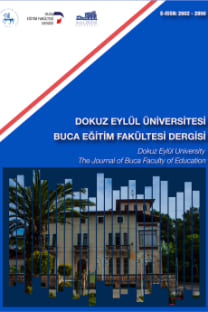YATILI İLKÖĞRETİM BÖLGE OKULLARININ SORUNLARINA İLİŞKİN ÖĞRENCİ VE ÖĞRETMEN GÖRÜŞLERİ
Bu çalışmanın amacı, yatılı ilköğretim bölge okullarının sorunlarına ilişkin öğrenci ve öğretmenlerin görüşlerini belirlemektir. Betimsel tarama modeli kullanılarak yapılan çalışmanın evrenini 2009-2010 eğitim-öğretim yılında, Bingöl ilinde bulunan 16 YİBO’da öğrenim gören 5354 öğrenci ile 192 öğretmen oluşturmaktadır. Araştırmanın örneklemini ise bu okullardan basit- tesadüfî örnekleme yöntemiyle belirlenen 56 öğretmen ile 430 öğrenci oluşturmaktadır. Araştırma için alan taraması sonucunda öğretmenlerin görüşlerini belirlemek için 42, öğrenci görüşlerini belirlemek için ise 47 maddelik bir anket hazırlanmış ve uzman görüşlerine başvurularak uygulanmıştır. Anket aracılığı ile toplanan verilere, aritmetik ortalama, standart sapma, t testi ve tek yönlü Varyans analizi yapılmıştır. Araştırmada öğretmenler, “olumlu okul iklimi ve velilerle ilişkiler” boyutunda, öğrenciler ise, öğrenci ihtiyaçlarının karşılanması ve sağlık” boyutunda, “nadiren” düzeyinin daha üstünde sorun olduğu görüşündedirler. Yine öğrenciler, “beslenme ve temizlik” boyutunda, “ara sıra” düzeyinde sorun olduğu görüşündedirler.
Anahtar Kelimeler:
Yatılı ilköğretim Bölge okulu, Okul-Veli İlişkisi, Sağlık ve Beslenme, Pansiyon, Belletici
TEACHERS’ AND STUDENTS’ OPINIONS ABOUT THE PROBLEMS OF REGIONAL BOARDING PRIMARY SCHOOLS.
This study is intended to determine teachers’ and students’ opinions about the problems of regional boarding primary schools. The universe of the study based on descriptive survey model consists of 192 teachers and 5354 students studying in 16 regional boarding primary schools (YİBO) in Bingöl province in the academic year 2009-2010. The sample of the research consists of 56 teachers and 430 students who were selected from these schools through simple-random sampling method. As a result of field scanning for the research, 42-item questionnaire for teachers and 47-item questionnaire for students were applied to determine their opinions after resorting to expert opinions. The collected data through questionnaire was analysed with Arithmetic mean, standard deviation, T test and one-way variance analysis. In the research, teachers think that there is a problem at more than “rarely” level in the dimension of “positive school climate and relatiions with parents” and students think so in the dimension of “meeting students’ needs and health”. Students think that there is a problem at “sometimes” level in the dimension of “ nutrition and hygiene”.
Keywords:
: Regional Boarding Primary School, School-Parent Relations, Health and Nutrition, dormitory, Tutor,
- Yayın Aralığı: Yılda 4 Sayı
- Başlangıç: 1992
- Yayıncı: Dokuz Eylül Üniversitesi
Sayıdaki Diğer Makaleler
İLKÖĞRETİM 6. SINIF TÜRKÇE DERSİNDE YARATICI YAZMA YAKLAŞIMININ TÜRKÇE DERSİNE YÖNELİK TUTUMA ETKİSİ
AKRAN DÖNÜT EĞĠTĠMĠ PROGRAMININ YAZMA BECERĠLERĠNĠN GELĠġĠMĠ ÜZERĠNDEKĠ ETKĠSĠ
ÖĞRETİMSEL LİDERLİK BOYUTU ÜZERİNE ÜNİVERSİTE MEZUNLARININ BAKIŞ AÇILARI
ÖĞRETMEN-ÇOCUK İLİŞKİLERİNİN ÇEŞİTLİ DEĞİŞKENLER AÇISINDAN İNCELENMESİ
Sibel Kılınç Alpat, Melis Arzu Uyulgan, Özge Özbayrak, Şenol Alpat
Öğretmen görüşlerine göre çeşitli yönetim becerilerinin okul müdürleri için önem dereceleri
İdris Şahin, Kadir Beycioğlu, Necla Fırat
YATILI İLKÖĞRETİM BÖLGE OKULLARININ SORUNLARINA İLİŞKİN ÖĞRENCİ VE ÖĞRETMEN GÖRÜŞLERİ
PROBLEME DAYALI ÖĞRENME YAKLAŞIMI İLE TÜRKÇE DERS PLANININ HAZIRLANMASI
